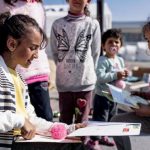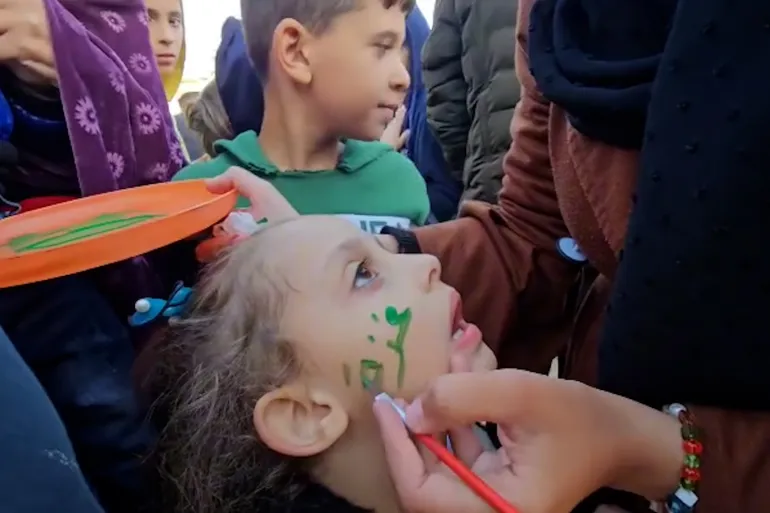Many children live the suffering of wars and conflicts and suffer from their scourges, including the harsh experience that the children of Gaza are currently experiencing as a result of the Israeli occupation’s war on their country.
Like Gaza, a number of countries are exposed to conflicts and wars that leave a profound impact on children, including Afghanistan and Sudan.
Many children around the world watch the details of wars on screens, and are also affected by them. What psychological effects do wars have on them, and how can we help them escape their negative impact?
Encourage them to express themselves
The psychologist Taghreed Saab says: “Children of war are sensitive and hurtful,” so we have to address their emotions, not just reassure them in a tangible way.
Don’t prevent him/her from crying
“We must avoid saying: Don’t cry, as this is the most dangerous thing we say to our children. If he feels sad, he should cry to express his feelings,” according to Saab.
Avoid watching harsh scenes as much as possible
Saab notes that she is not speaking here just because she is a psychologist, “but as someone who actually lived the war in Lebanon when I was less than 3 years old, and I still remember an image I saw on television of a massacre that stuck in my head, knowing that my family was wary of us seeing this.” “The sights, and the nightmares continued to haunt me for a long time…and I still remember them.”
This is why Saab advises parents not to expose their children to watching images of war on television, because it will stick in their memories and may cause them psychological problems later.
Psychological problems
As for the family counselor and community guide, Hamsa Younes, she confirms that the scenes of horror, killing, and destruction that children of war are exposed to “will leave many negative psychological effects on them, whether in the short or long term. Therefore, they need psychological rehabilitation sessions that will enable them to emerge from this war with the least psychological losses.”
Younis adds that the atmosphere of war creates many problems for children, including:
- Extreme anxiety, especially fear of death or loss.
- Sleep problems and disturbing dreams resulting from painful memories stored by their subconscious mind.
- The child may fall into a state of intense sadness that may expose him to depression.
- He may become irritable, and enter into extreme, exaggerated outbursts of anger at the simplest situations as a form of emotional release of the doses of pain, fear, and anxiety that they experienced in war scenes.
Free him from psychological emotions
According to what we saw on the screens and what the people of Gaza said, this war was the harshest and most ferocious, and this requires greater effort from the parents and children to overcome the psychological accumulations resulting from the war, says Younis.
Younis says, “During my communication with the mothers after the truce, they expressed to me their feeling that they had lost their sense of anything, and that they were unable even to cry. This requires helping mothers and fathers also to release themselves emotionally so that they can support their children psychologically.”
Younis provides some important advice on dealing with children in wartime conditions, including:
- Ask the children to do a breathing exercise; Make a long, deep inhale and exhale while counting to ten.
- Encourage the children to repeat some of the short dhikr and surahs of the Holy Qur’an that they have memorized. To enhance the sense of certainty and trust in God and that they are under the protection of the Most Gracious.
- Encourage children to express their fear by giving them space to express their feelings, whether by talking or even crying.
- Give the child his space to recall memories he lived in the house he lost or with the person he lost.
UNICEF advises
The United Nations Children’s Fund (UNICEF) provided advice for dealing with children of war, which it published on its official website as follows:
- Find out what they know and how they feel. When the child feels comfortable, he speaks freely.
- Do not underestimate or ignore your children’s fears.
- Drawing and reading stories are activities that open dialogue with children.
- Keep your speech calm and appropriate to the child’s age.
- Don’t overshare your concerns with your child.
- As much as you can, reassure your children that they are safe from any danger.
- Focusing on those who help, it is important for children to know stories that have a positive impact.
- Remind your children that many people are working hard around the world to stop conflict and bring peace.
- Avoid talking about these topics right before bed.
- If your child talks to you about his fears right before bedtime, end your conversation with something positive – such as reading his favorite story – to help him sleep deeply.






